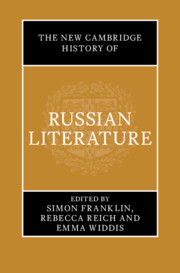Book contents
- The New Cambridge History of Russian Literature
- The New Cambridge History of Russian Literature
- Copyright page
- Contents
- Figures
- Contributors
- Acknowledgements
- On Transliteration, Names, and Dates
- Introduction
- History 1 Movements
- History 2 Mechanisms
- History 3 Forms
- 3.1 Forms before Genres
- 3.2 Folk Genres
- 3.3 Verse I
- 3.4 Drama I
- 3.5 The Novel I
- 3.6 The Short Story
- 3.7 Drama II
- 3.8 Verse II
- 3.9 The Novel II
- 3.10 Self-Writing
- 3.11 (Plat)forms after Genres
- Boxes 5 Critical Frames
- Boxes 6 Literature beyond Literature
- History 4 Heroes
- Index
Boxes 5 - Critical Frames
from History 3 - Forms
Published online by Cambridge University Press: 31 December 2024
- The New Cambridge History of Russian Literature
- The New Cambridge History of Russian Literature
- Copyright page
- Contents
- Figures
- Contributors
- Acknowledgements
- On Transliteration, Names, and Dates
- Introduction
- History 1 Movements
- History 2 Mechanisms
- History 3 Forms
- 3.1 Forms before Genres
- 3.2 Folk Genres
- 3.3 Verse I
- 3.4 Drama I
- 3.5 The Novel I
- 3.6 The Short Story
- 3.7 Drama II
- 3.8 Verse II
- 3.9 The Novel II
- 3.10 Self-Writing
- 3.11 (Plat)forms after Genres
- Boxes 5 Critical Frames
- Boxes 6 Literature beyond Literature
- History 4 Heroes
- Index
Summary
Vissarion Belinskii (1811–1848) is the most famous and influential literary critic in the history of Russian literature. Despite regular attempts to demonstrate the destructive effect of his ideas, Belinskii’s reputation has proved resilient. Yet the reasons why he remains such an influential figure can be hard to grasp.
Belinskii’s assessments do not always coincide with subsequent views on the literary canon, yet his intuitions could be impressive. For instance, he declared the primacy of Nikolai Gogol in the Russian canon long before Gogol had produced Inspector General (Revizor, 1836), Dead Souls (Mertvye dushi, 1842), or ‘The Overcoat’ (Shinel', 1842). Belinskii also admired the works of the young Mikhail Lermontov, who at the time had published very little. His review of Inspector General determined the main trend in the history of its interpretation, seeing it through a social lens.
- Type
- Chapter
- Information
- The New Cambridge History of Russian Literature , pp. 658 - 668Publisher: Cambridge University PressPrint publication year: 2024

